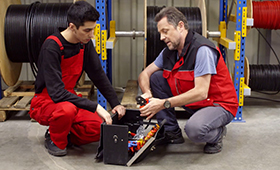Vocational education and training – the key to integration
BIBB analyses on the vocational integration of refugees
40/2017 | Bonn, 16.11.2017

Improving the integration of refugees in Germany in future by means of vocational education and training will be critically dependent on providing individually-tailored training programmes of the right quality and in the right amounts. These must be able to accommodate the range of education and training requirements, life situations, their experiences as refugees, and their age. Existing measures supporting preparation for training should be developed further within regular programmes in terms of the support provided and ongoing supervision. Sufficient time must also be included at the start for delivering basic competencies and for integrating language support in existing training programmes.
These are some of the key findings from analysis of the Federal Institute for Vocational Education and Training (BIBB) which were carried out in 2016 and 2017. The academic research discussion paper entitled “Refugees and vocational education and training” is available for download from the BIBB website.
“Vocational education and training is key to integration and it must be understood as an investment in integration in Germany over the long term,” stressed BIBB President Friedrich Hubert Esser. “The dual system of vocational education and training can build a bridge into the world of work and society when the practical element of the training involves integrating the trainee within the company and within the everyday work of the company. This is particularly the case in small and medium-sized enterprises.” He added that company-based socialisation plays a crucial role in this respect and also requires an understanding of the life situation of refugees.
Companies were actively showing their willingness to train refugees as early as 2016. At that time, according to a BIBB company survey, one in every ten small and medium-sized enterprises offered placements or training positions for refugees. However, in order to provide additional places in future, the SMEs surveyed indicated a need for support in particular in terms of additional offers in the transition into training, for example by means of placements, in terms of a reduction in paperwork, and with individual supervision and learning support before and during the training. The priority here for SMEs is German courses to accompany training and company placements lasting several weeks before training, closely followed by completion of external formalities and assistance to accompany training.
Even though increased numbers of refugees are currently in the process of completing vocational orientation and vocational training preparation programmes, the numbers of applicants for vocational education and training have now also grown significantly. For example, according to a study conducted jointly by the BIBB and the Federal Employment Agency (BA/BIBB migration study) approximately one in four of all applicants registered with an employment agency from a non-European country of origin were in company-based training at the time of the survey at the end of 2016/start of 2017.
The “Academic research discussion paper” from the BIBB, issue no. 187, entitled “Refugees and vocational education and training” can be downloaded on the Internet free of charge at www.bibb.de/wdp-gefluechtete-und-berufliche-bildung (in German only).
Specimen copy requested if printed.